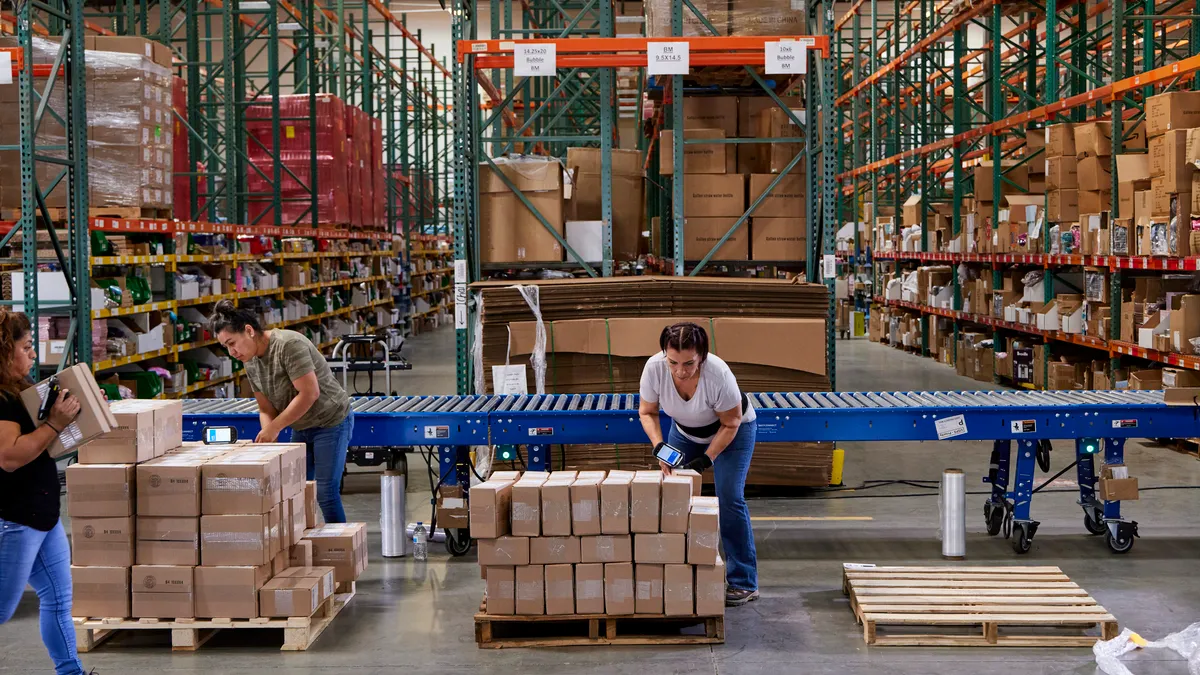Dive Brief:
- Shopify's integration of Deliverr will help the company build out its fulfillment capabilities for merchants in a more cost-effective manner, CFO Jeff Hoffmeister said at Morgan Stanley's Technology, Media and Telecom Conference last week.
- The addition of Deliverr, an e-commerce fulfillment and order storage provider, provides Shopify with an asset-light network of warehouse partners, along with carriers and last-mile providers. Hoffmeister said partners can help core hub operations and areas where inventory is located "on the edge of the network."
- "Some of the technology we got from Deliverr allows us to do this in a distributed way, and then tackle some things which Amazon and others have in terms of problems we don't have," Hoffmeister added. Amazon has recently grappled with elevated operating costs and excess capacity throughout its logistics network.
Dive Insight:
Building a fulfillment network that can serve both the needs of merchants and delivery expectations of consumers is an expensive and lengthy undertaking. But Shopify leaders say the purchase of Deliverr is accelerating progress in that area as it looks to provide services to merchants throughout the supply chain.
"With Deliverr, what they're bringing is a network and fulfillment management software layer, which helps to predict demand and place inventory at a point that is closest to that demand," Senior Manager of Investor Relations Ana Raman said at a separate conference last week. "And by doing that, we believe that we can decrease the time to which we can get a product to the end customer, and thereby reduce cost as well."
While the size of competitor Amazon's fulfillment network remains unrivaled in the e-commerce space, it has struggled under the weight of fixed costs. Amazon rapidly expanded its distribution network during a boom in e-commerce sales, but growth slowed in 2022, resulting in excess warehouse capacity and inefficiencies.
The fulfillment network that Shopify is building is much different than what other companies have, President Harley Finkelstein said. He pointed to Amazon operating a single network with millions of SKUs within it as a model Shopify isn't interested in emulating.
"What we're trying to build instead is, what if we created a lot of small networks with 20 SKUs, like Allbirds for example," Finkelstein said. "You can pick a hoodie, a pair of sneakers and a pair of sandals. That is a much easier thing for us to do and it's a lot less capital intensive."
Deliverr providing access to "elastic warehouse capacity" will advance Shopify's fulfillment network vision, but it will take time for the company to fully realize the acquisition's benefits. Deliverr users currently make up "a very, very small percentage" of Shopify's overall merchant base, Hoffmeister said, which the company aims to change once the integration is complete.
"Part of the opportunity for us is once we do have Deliverr fully integrated to ramp that and get more and more of our merchants using Deliverr," Hoffmeister said.














